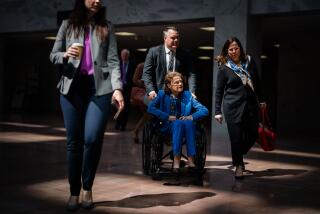Rehnquist Foes Attack as Debate Begins
- Share via
WASHINGTON — Opponents of Supreme Court Justice William H. Rehnquist accused him Thursday of deliberately misleading the Senate and the American people as the chamber opened debate on his nomination to become the nation’s 16th chief justice.
Senate Majority Leader Bob Dole (R-Kan.), predicting confirmation of Rehnquist and Judge Antonin Scalia as an associate justice by “big numbers,” dismissed the criticism of Rehnquist as “another attempt to deface a brilliant career with spray-paint graffiti.”
“The case boils down to one simple fact,” Dole said. “Those who would torpedo these nominations are liberal, and the President’s nominees are conservative.”
Denial by Critics
But Sen. Howard M. Metzenbaum (D-Ohio) and other Rehnquist critics denied that politics fueled their attack, citing the fact that Scalia had won unanimous approval of the Senate Judiciary Committee, where Rehnquist had five of 18 votes cast against him.
And throughout their criticism ran the theme that Rehnquist had not been truthful in his Senate testimony and public explanations of points raised against him.
Metzenbaum, for example, cited Rehnquist’s statement that a pro-segregation memo he wrote in 1952 as a law clerk for the late Justice Robert H. Jackson represented Jackson’s view--an explanation that Metzenbaum said “just won’t wash.”
“The issue is not whether he was right or wrong,” Metzenbaum said. “The issue is that he deliberately misled the Senate and the American people.”
Hatch Leads Defense
Sen. Orrin G. Hatch (R-Utah), who led Rehnquist’s defense, said the critics were “making much ado about very little,” resolving every ambiguity against Rehnquist and engaging in “personal attacks and misleading criticism.”
Senators on both sides repeatedly cited the historical nature of the debate and said they regarded their votes as the most important they would cast. But the first day was listless and conducted before a near-empty chamber with the galleries only sparsely filled. Speeches were frequently separated by quorum calls as Rehnquist’s opponents stalled for time to line up their next speaker.
Metzenbaum interrupted his first speech to lament the lack of attendance, saying he was disappointed that more of his colleagues were not listening. At that point, the only other member on the Senate floor, Sen. James T. Broyhill (R-N.C.), rose from his seat and left the chamber, reducing the Senate audience to Sen. Nancy Landon Kassebaum (R-Kan.), who was presiding.
Eagleton Tells Opposition
Sen. Thomas F. Eagleton (D-Mo.) became the seventh senator to announce that he would vote against confirming Rehnquist, saying that “he is not entitled to inexhaustible benefit of all doubts.”
On the issue of the memorandum for Jackson and the disputed charge that Rehnquist had intimidated minority voters in Arizona in the 1960s, Eagleton said the benefit of doubt would go to Rehnquist because of his reputation as a Supreme Court justice, if those issues stood alone.
But on the point that Rehnquist had refused to disqualify himself from ruling in a 1972 case of Army spying on anti-war dissidents, despite indications that he had played a role in formulating the policy as a top Justice Department lawyer, Eagleton said that “it just isn’t fair. That’s the test.”
“These matters do not stand alone,” Eagleton said. “They stand in the aggregate. . . . There is a deeply disquieting sense arising from the Rehnquist record that compels me to conclude that he is not entitled to inexhaustible benefit of all doubts.”
The debate is scheduled to resume today, and a vote is likely early next week. An aide to Dole estimated Thursday that Rehnquist’s opponents may pick up as many as 30 votes.
More to Read
Get the L.A. Times Politics newsletter
Deeply reported insights into legislation, politics and policy from Sacramento, Washington and beyond. In your inbox twice per week.
You may occasionally receive promotional content from the Los Angeles Times.










